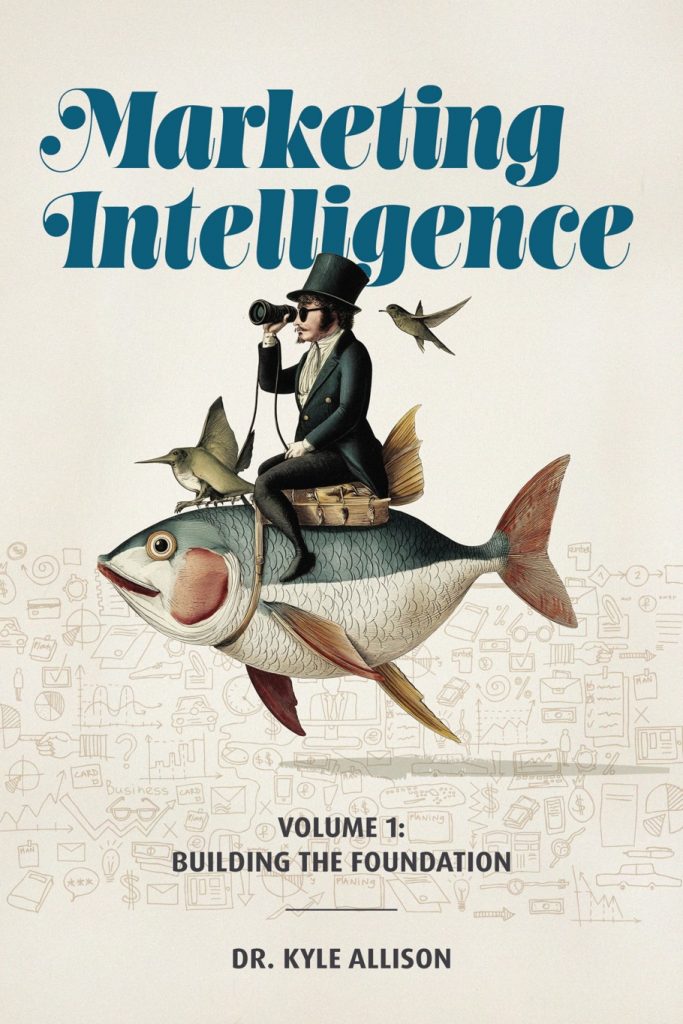
Marketing has come a long way from catchy jingles and billboard campaigns. This book by Dr. Kyle Allison shows you how to use the latest data-focused practices, like analytics, data mining, and data acquisition/integration techniques to get more value from your marketing budget and truly get to know your customers.
I like to read a book a few pages at a time, put it down for a while, think about the content, and come back to it later. I found that with this book, I was reading much more than I intended at each sitting. I think that is because the book has a fast-paced yet entertaining reading style that pulled me in, almost like a good novel. I was surprised how quickly I finished reading the book!
Here’s a short summary of each of the 11 chapters:
- Chapter 1, The Evolution of Marketing in the Data Age. This chapter kicks things off with a fun trip down marketing memory lane — back when advertising on a billboard was the whole strategy. We learn how marketing has evolved into a data-powered, precision game where everything is measurable. With examples from Netflix, Amazon, and Starbucks, Allison explains how consumer behavior, AI, and big data flipped the marketing script from guesswork to science.
- Chapter 2, Know Your Marketing Data. Here, we get into the heart of what makes data-driven marketing tick. Allison breaks down the different types of data — like behavioral, transactional, and psychographic — and how marketers can use them to craft homerun campaigns. He also stresses the importance of developing the right mindset and skill set to thrive in a data-rich world (hint: creativity still matters, but you need to speak spreadsheet, too).
- Chapter 3, Fundamentals of Marketing Data Management. This chapter is Marketing Data 101. Allison lays out how to collect, organize, and manage different types of data. Data governance and quality assurance are covered, arguing that a messy data house leads to even messier decisions.
- Chapter 4, Mining the Marketing Data. This chapter goes into the details of data mining and how to pull insights from massive data sets. Allison covers different mining methods, including web and text mining, with lots of real-world examples of brands using these techniques. You also don’t need to be a wizard — just curious, analytical, and willing to experiment.
- Chapter 5, Data Acquisition: Partnerships to Marketplaces. Allison shifts focus here to where you actually get your data. He talks about building strategic partnerships, sourcing from data marketplaces, and avoiding junk data traps. This chapter’s message: not all data is created equal. If you’re buying bad data or are not clear on the quality or source of your data, your marketing efforts start from a shaky place.
- Chapter 6, Data Integration: Technical to Marketing Operations. This chapter is about connecting the dots — technologically and operationally — so your data isn’t stuck in silos. Allison blends IT and business language well, reminding us that integration is not just a tech issue; it’s a people and process one, too. Get everyone aligned, and your insights go from scattered to strategic.
- Chapter 7, Goal Development to KPI Selection. You can’t improve what you don’t measure, right? This chapter dives into setting smart goals and picking the right KPIs to measure success. There’s a lot of emphasis on meaningful indicators like conversion rates and customer lifetime value. Allison encourages marketers to use data to stay agile and adjust on the fly.
- Chapter 8, Data Ethics in a Marketing Context. It’s not all spreadsheets and dashboards — ethics matter, too. This chapter gets into privacy, data protection, and how to market responsibly in an age where misusing data can tank your reputation (and your business). The Marriott data breach is raised as a cautionary tale. Allison makes a solid case for ethical data use as both the right thing and the smart thing.
- Chapter 9, The Human Element Amid AI & Technology. This chapter covers emotional intelligence, creativity, and diversity in marketing — traits that no algorithm can fully replicate. He argues for human-AI collaboration and gives tips on keeping humanity at the center of even the most data-heavy campaigns.
- Chapter 10, Go Big or Go Home. Allison shows how real-time analytics and agile marketing strategies can help businesses react quickly and scale smartly. He highlights case studies where being nimble made a big difference and talks about planning for the unplannable — building systems that can robustly handle whatever the market throws your way.
- Chapter 11, Closing Thoughts. Allison wraps it up with a final push to focus on fundamentals. Don’t chase trends without laying the groundwork. A strong marketing intelligence system isn’t just about having the right tools — it’s about building the right culture, mindset, and foundation to grow on.
One of the book’s messages is that it isn’t just about learning tools or techniques. It’s about learning how to think like a data-driven marketer. I recommend this book, even if you are not a marketing person. It’s really for anyone who needs to understand the types of data available, how to manage that data responsibly, and how to make it work across the entire marketing pipeline — from collection to analysis to implementation.
Looking forward to the release of Volume 2!

